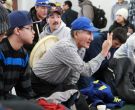The Deline Self-Government Team loves questions and we want to answer them all.
Each week we will post an update of questions people are asking, or rumours that need clarifying. Here are some questions that came up this week. We also have a printable version of this information.
You can submit any new questions or rumours by:
- Calling 1-855-428-5522
- Emailing us through our "contact us" page
- Stopping by the Self-Government Office in Deline (Cultural Centre) or Yellowknife (upstairs from the North Wright counter at the airport)
Questions about taxation and benefits for non-resident beneficiaries
Q: If we lose special tax exemptions for on-reserve purchases, how do beneficiaries who live in the south and use these rights benefit from self-government?
A: In exchange for individual tax benefits, we will gain a tax benefit as a group. This is good for all beneficiaries, not just those who live in Deline. With self-government, the Deline Got’ine Government (DGG) will have a lot more flexibility with how land claim moneys are used for beneficiaries (in ways that are not taxable). The DGG will be able to make investments to make money for beneficiaries that will not be subject to the same taxes as they are now. The DGG will be able to make payments to Deline beneficiaries as the Deline Land Corporation did this year. All beneficiaries (regardless of where they live) will be able to have input into decisions about how land claim assets are used through the Beneficiaries Board.
Q: How is it fair that the Deline Got’ine Government will not have to pay GST if individuals are losing their individual GST exemption after eight years?
A: In Canada, governments generally do not pay GST (federal, provincial, municipal and Aboriginal governments). The Deline Got’ine Government (DGG) will receive GST as a government and will use those tax dollars to fund programs and services. For beneficiaries who don’t live in Deline, the benefits of this may not be as direct. However, funding used to strengthen your home community and the language and culture of Deline will benefit everyone who calls Deline home or who still has friends and family in Deline.
Q: How is it that our health and dental benefits are not affected if Deline stops paying taxes to the Canadian government? Does it become the burden of the non-resident beneficiaries to pay for these benefits?
A: Health and dental benefits are Status Indian benefits available to all Status Indians in Canada. This means that Status Indians who are Deline First Nation Citizens will continue to receive these benefits once self-government is in place.
Because the Deline Got’ine Government (DGG) is taking over government functions, it will receive most of the tax dollars that our people are currently paying to the Government of Canada. However, the DGG will not get all tax dollars paid by Deline residents. For example, the part of their taxes that goes to the GNWT will continue to go to the territorial government to fund all the programs and services it continues to deliver to Deline residents (health, education, etc.). Taxes paid by people who don’t live in Deline will continue to go to the federal and provincial/territorial governments as they do now as they will continue to use the programs and services provided by these governments.
Q: How do non-resident beneficiaries benefit from self-government?
A: Non-resident beneficiaries will not be as directly impacted by self-government as those who live in Deline. They can continue to be as involved as they choose to be through the Beneficiaries Board. They will also benefit from self-government in other ways, such as:
- A more efficient, integrated approach to managing land claim rights and assets
- More flexibility in how land claim assets are used to create benefits for all its beneficiaries (no matter where they live)
- A better situation in Deline for friends and family who are still living there
- A better foundation to protect and strengthen Deline culture, language and traditions
Questions related to resource development in the Sahtu region
Q: I am concerned about fracking and what is happening on our land. How can Deline Self-Government help us deal with this?
A: Hydraulic fracturing, or “fracking,” is a method used to remove oil or natural gas from underground rock. A liquid (typically water mixed with sand and chemicals) is injected into the rock at high pressure. This creates small fractures in the rock and releases the oil or gas.
We understand peoples’ concerns about fracking because it is a very immediate issue for everyone in our region. Self-government will not change how oil and gas projects are permitted. That will still be done through the National Energy Board and the Sahtu Land and Water Board. Also, projects will be subject to environmental review by the Mackenzie Valley Environmental Impact Review Board. But the Deline Got’ine Government will have a significant influence and will be involved whenever Deline settlement lands are impacted. There will be many opportunities for Deline First Nation Citizens to tell their government how they want to be represented in these processes, including the Community Gathering that must be held every year.
Questions about whether Deline is ready to take on self-government
Q: Is Deline ready for all the responsibility of self-government?
A: The new Deline Got’ine Government (DGG) will not take on all powers right away. In fact, for the first several years, the DGG will mostly just be taking over the roles and responsibilities that people in the DFN, DLC and Charter Community are already managing, and will have the same staff. Over time, the DGG has the ability to choose to take on more responsibility when it is ready. There is also a Deline Transition Team that has developed a plan to make sure that Deline can handle the change.
Q: Will the Deline Got’ine Government have the capacity to assume responsibility and deliver programs and services in areas such as education, housing and health?
A: For the first several years, the Deline Got’ine Government will only manage the programs and services that the DFN, DLC and Charter Community currently manage. Over time, the DGG can take on more responsibility when it is ready. When it comes to health care, the DGG will only have authority over traditional healing services and to make arrangements for managing the health programs and services of other governments. Unless all parties agree to amend the Final Self-Government Agreement, the GNWT will keep its authority over primary health care programs and services.
Other questions
Q: Would we be able to postpone our vote until a later date?
A: The voting date was chosen for several reasons. The negotiators have been making sure there have been community information sessions and workshops, newsletter updates, and presentations to the DLC and First Nation regularly over the last 18 years.
There is also the fact that there will be a federal election in the fall of 2015. The concern is that if the ratification vote is not held early in 2014, then the government of Canada would not have enough time to pass the agreement into law before the next election. This would mean the agreement would have to go through the law-making process all over again. This could delay the implementation by another year or two at least. In elections, governments can change and new MPs get elected. This could mean that Deline representatives will have to spend more time and money lobbying MPs from other parts of Canada to support the Deline agreement so it passes into law, instead of doing the work that needs to be done in the community.
Q: If people vote "no" to self-government now, will that mean we will not be able to ever be self-governing later?
A: The negotiating team has asked this question to the Government of Canada. Our understanding is that if Deline votes no, we will likely go to the bottom of Canada’s list for a new set of negotiations. Canada has limited resources to negotiate, and must do so with a number of First Nations, so a “no” vote would likely mean that we would not be a priority.
Deline’s land claim specifies that Canada must negotiate self-government with us. We expect that if we vote “no”, Canada could argue that the past 18 years of negotiations fulfil their obligation to negotiate with us, and that they no longer have to negotiate after a failed vote. Deline could argue that Canada’s obligation is to reach an agreement, not just to negotiate. It still isn’t clear which argument would succeed, but a “no” vote could mean that Deline will not get another chance at self-government. Even if we would get another chance, it is unlikely that new negotiations would result in an agreement that is very different from the agreement that is being put to a vote now.
Q: How does devolution affect this agreement?
A. Devolution does not affect the powers of the Deline Got’ine Government (DGG). However, under devolution the DGG will:
- Receive a share of resource revenues provided to the Sahtu Secretariat Inc. through the Resource Revenue Sharing Agreement; and
- Have a say in the Resource Management Forum that is created by the devolution agreement.




